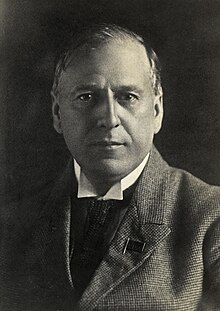
Back كريستيان راكوفسكي Arabic كريستيان راكوفسكى ARZ Кръстьо Раковски Bulgarian Christian Rakovskij Czech Christian Georgijewitsch Rakowski German Kristiano Rakovski Esperanto Christian Rakovski Spanish Khristian Rakovski Basque کریستین راکوفسکی Persian Christian Rakovski Finnish
 Rakovsky c. 1920s | |
| 1st Chairman of the Council of People's Commissars of the Ukrainian SSR | |
| In office 16 January 1919 – 15 July 1923 | |
| Preceded by | Georgiy Pyatakov |
| Succeeded by | Vlas Chubar |
| Soviet Ambassador to France | |
| In office October 1925 – October 1927 | |
| Preceded by | Leonid Krasin |
| Succeeded by | Valerian Dovgalevsky |
| Personal details | |
| Born | Krastyo Georgiev Stanchev 13 August 1873 Gradets, Ottoman Empire (now Bulgaria) |
| Died | 11 September 1941 (aged 68) Oryol, Russian SFSR, Soviet Union |
| Cause of death | Execution by firing squad |
| Nationality | Bulgarian, Romanian, Russian, Ukrainian |
| Political party | Russian Communist Party (1917–1937) |
| Spouse(s) | E. P. Ryabova (desc.) Alexandrina Alexandrescu (Ileana Pralea) |
| Education | University of Geneva[1] |
| Profession | Physician, journalist |
| Signature | |
Christian Georgiyevich Rakovsky[a] (August 13 [O.S. August 1] 1873 – September 11, 1941), Bulgarian name Krastyo Georgiev Rakovski, born Krastyo Georgiev Stanchov, was a Bulgarian-born socialist revolutionary, a Bolshevik politician and Soviet diplomat and statesman; he was also noted as a journalist, physician, and essayist. Rakovsky's political career took him throughout the Balkans and into France and Imperial Russia; for part of his life, he was also a Romanian citizen.
A lifelong collaborator of Leon Trotsky, he was a prominent activist of the Second International, involved in politics with the Bulgarian Workers' Social Democratic Party, Romanian Social Democratic Party, and the Russian Social Democratic Labour Party. Rakovsky was expelled at different times from various countries as a result of his activities, and, during World War I, became a founding member of the Revolutionary Balkan Social Democratic Labor Federation while helping to organize the Zimmerwald Conference. Imprisoned by Romanian authorities, he made his way to Russia, where he joined the Bolshevik Party after the October Revolution, and unsuccessfully attempted to generate a communist revolution in the Kingdom of Romania. Subsequently, he was a founding member of the Comintern, served as head of government in the Ukrainian SSR, and took part in negotiations at the Genoa Conference.
He came to oppose Joseph Stalin and rallied with the Left Opposition, being marginalized inside the government and sent as Soviet ambassador to London and Paris, where he was involved in renegotiating financial settlements. He was ultimately recalled from France in autumn 1927, after signing his name to a controversial Trotskyist platform which endorsed world revolution. Credited with having developed the Trotskyist critique of Stalinism as "bureaucratic centrism", Rakovsky was subject to internal exile. Submitting to Stalin's leadership in 1934 and being briefly reinstated, he was nonetheless implicated in the Trial of the Twenty One (part of the Moscow Trials), imprisoned, and executed by the NKVD during World War II. He was rehabilitated in 1988, during the Soviet Glasnost period.
- ^ Marples, David R.; Hurska, Alla (23 August 2022). Joseph Stalin: A Reference Guide to His Life and Works. Rowman & Littlefield. p. 183. ISBN 978-1-5381-3361-3.
Cite error: There are <ref group=lower-alpha> tags or {{efn}} templates on this page, but the references will not show without a {{reflist|group=lower-alpha}} template or {{notelist}} template (see the help page).